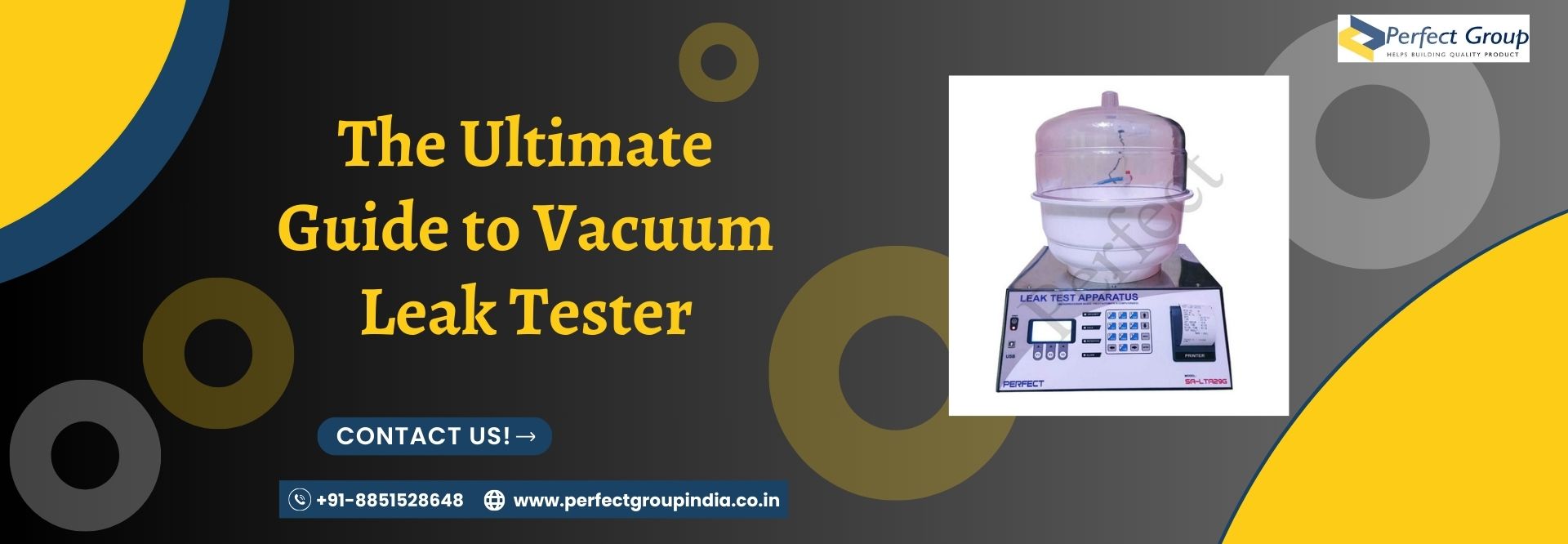In many different industries, vacuum leak testing is a vital procedure that guarantees the reliability and security of goods. One of the most important tools for this job is the vacuum leak tester, which is essential for finding leaks and guaranteeing quality control. This thorough guide will cover the nuances of vacuum leak testing, their functions, applications, and important factors to take into account when selecting one for your particular requirements. Product integrity and safety are confirmed in a variety of industries through vacuum leak testing. In order to maintain quality standards, the
vacuum leak tester is essential for finding leaks. With a focus on the importance and selection guidelines based on particular requirements, this guide offers a thorough examination of vacuum leak testing.
Understanding Vacuum Leak Tester:
One technique to find leaks or flaws in sealed goods or packaging is vacuum leak testing. In order to find leaks, it entails creating a vacuum inside a chamber or surrounding the test specimen and keeping an eye out for any pressure variations. In sectors where maintaining product integrity is critical, like pharmaceuticals, food and beverage, automotive, electronics, and more, this procedure is essential. In sectors including pharmaceuticals, food and beverage, automotive, and electronics, vacuum leak testing is essential for guaranteeing product integrity. Accurate leak detection helps prevent contamination and guarantees that products adhere to strict quality and safety standards, preserving consumer confidence and brand reputation.
The Importance of Vacuum Leak Tester:
In order to make sure that products fulfill strict safety and performance standards, vacuum leak testers are essential tools for quality assurance. These testers guard against contamination, product failures, and safety risks by precisely identifying leaks. They are essential for preserving the caliber of the final product, cutting down on waste, and protecting brand equity.
How Vacuum Leak Tester Work:
In order for a vacuum leak tester to work, a controlled vacuum environment must be created around the test specimen, which is usually a sealed product or package. The presence of leaks is then determined by the tester by measuring any changes in chamber pressure. Numerous techniques, including mass flow, pressure decay, vacuum decay, and tracer gas detection, can be used, depending on the application and level of sensitivity needed.
Applications of Vacuum Leak Testing:
Applications for Vacuum Leak Testing are found in many different products and industries. It guarantees the integrity and freshness of packaged goods, including bottles, cans, and pouches, in the food and beverage industry. It confirms the sealing of parts like fuel tanks and brake systems in the automotive industry. Furthermore, vacuum leak testing is essential in the pharmaceutical industry to guarantee the safety and effectiveness of medication packaging.
Key Considerations When Choosing a Vacuum Leak Tester:
There are a few things to take into account when choosing a vacuum leak tester for your particular application. These include the test's sensitivity, the need for throughput, the kind of product or packaging being tested, regulatory compliance, and financial limitations. Selecting a tester that can satisfy your quality control goals in terms of accuracy, dependability, and usability is crucial.
Conclusion:
To sum up, vacuum leak testers are essential instruments for guaranteeing the quality, safety, and integrity of a wide range of goods in a variety of sectors. These testers support brand reputation, guarantee regulatory compliance, and avert expensive product recalls by precisely identifying leaks and flaws. Think about your unique needs when choosing a
vacuum leak tester, and pick the option that best satisfies your requirements for quality control. Superior product quality and customer satisfaction can be attained with the appropriate Vacuum Leak Tester in place.
Frequently Asked Questions (FAQs)
1. What industries benefit from vacuum leak testing?
Vacuum leak testing is invaluable in sectors such as pharmaceuticals, food and beverage, automotive, electronics, and more. It ensures product integrity by detecting leaks, which is crucial for maintaining quality standards and consumer safety.
2. How do vacuum leak tester contribute to quality assurance?
Vacuum leak tester play a pivotal role in quality assurance by accurately identifying leaks in sealed products or packaging. This prevents contamination, product failures, and safety hazards, ultimately safeguarding brand reputation and consumer trust.
3. What factors should be considered when choosing a vacuum leak tester?
When selecting a
vacuum leak tester, factors such as sensitivity of the test, throughput requirements, type of product or packaging, regulatory compliance, and budget constraints should be taken into account. Choosing the right tester ensures accurate and reliable leak detection tailored to specific needs.
4. What are the different methods used in vacuum leak testing?
Vacuum leak testing employs various methods, including mass flow, pressure decay, vacuum decay, and tracer gas detection. The method chosen depends on the application and level of sensitivity required to detect leaks effectively.
5. What are the benefits of vacuum leak testing for product integrity?
Vacuum leak testing ensures the integrity and freshness of packaged goods, confirms the sealing of automotive components, and guarantees the safety and effectiveness of medication packaging. By preventing leaks and flaws, vacuum leak testing maintains product quality, safety, and regulatory compliance.
